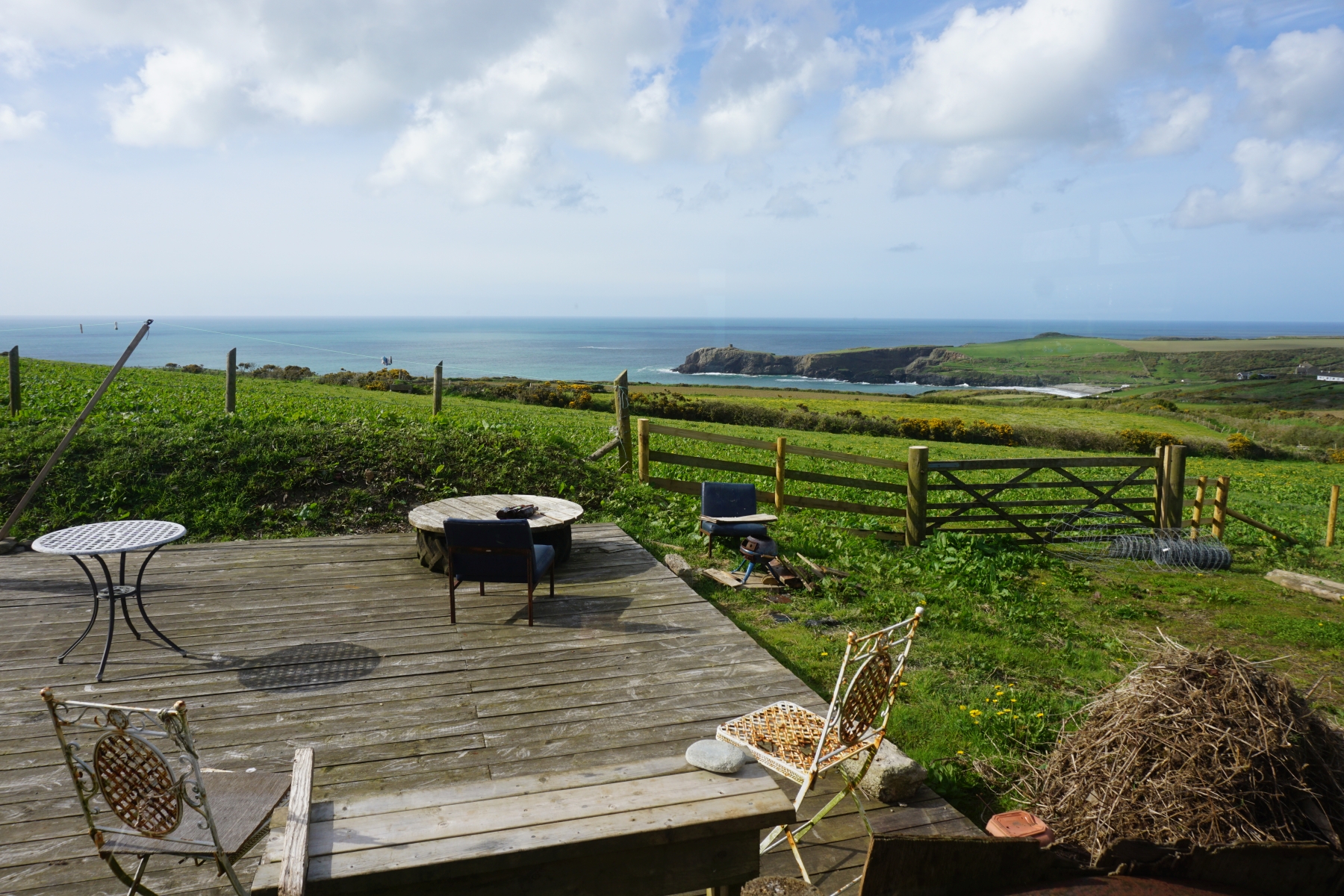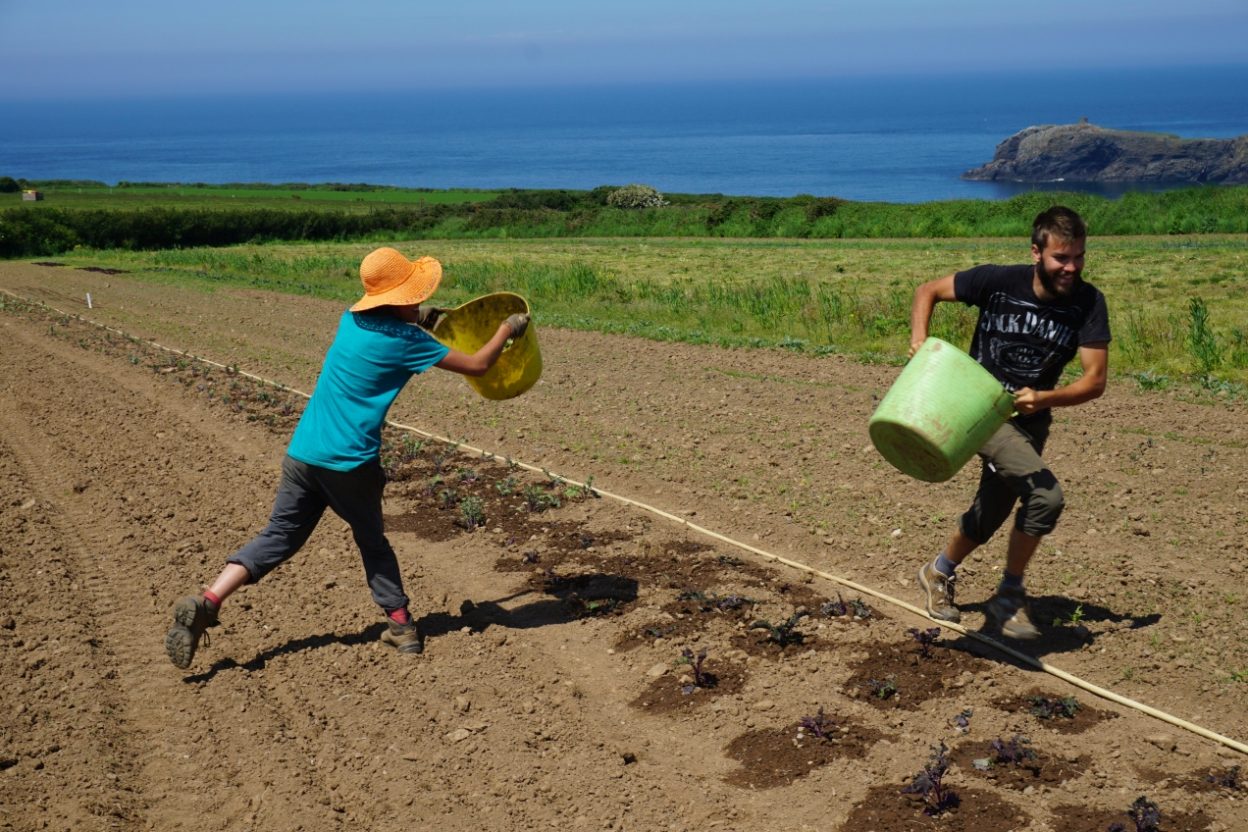After Ingrid’s introduction to the ideas of Agri-Activism, it is my turn (Lena) to offer you a glimpse into our lives as agri-activists! At the time of writing we have been on Caerhys Organic farm for a whole month, which is a good time to reflect upon the things learned so far. For this reason I will share with you what it has been like to be an absolute newcomer to work and life on a farm.
First Impressions
The countryside tends to be idyllic and the same is true for Caerhys Farm. Situated just next to the Irish Sea, with a patch of beach in walking distance, we are mostly surrounded by fields and isolated cottages. Human life is quiet and calm but you will hear the buzzing wildlife around you – birds, flies, bees and others live in and of the farm. Since there are so few buildings around, I found myself waking up to an early sunrise at 4am several times. I imagine how in old times people might have risen with the sun, but today I am happy to fall back asleep for few more hours before getting up to work.

Working on the Farm
Most of us will at some point in life have tried to grow vegetables, be it in school or as a personal pastime. But most people that I know of don’t have the interest, time or space to tend to their own vegetable garden. This results in a lesser understanding of how much effort it takes to grow food – a commodity that we mostly take for granted. On Caerhys Farm we experience the whole journey from seed to vegetable.
Each week starts off by sowing three trays of salads, adding up to 240 plants per tray. We water them in and leave them in the greenhouse where they germinate and grow into young plants. After few weeks we take them to the outside where the plants are hardened off – meaning they get used to the milder climate and the wind.
After another week or two we take them out to the fields, where we transplant them, watering and weeding them daily to guarantee for a regular harvest. And oh boy, do the newly-picked salads taste delicious! We have become so fond of their fresh taste that we barely want to touch any left-over salads from yesterday’s dinner.

Maintaining the vegetables is a lot of work, so each day you will see the five to eight volunteers on Caerhys Farm watering, weeding and trimming the plants; giving them extra support by installing hose pipes to offer a constant supply of water; sticks and strings to give tomatoes and beans something to climb up or building scarecrows to defend the cabbages from hungry pigeons. With all these efforts taken, one really starts to care about the plants, leaving some of us frustrated when the spinach we had transplanted was destroyed by mistake.

Farm work is a lot about getting your hands dirty – and it is great fun! You might discover the meditative qualities of watering courgettes and pumpkins for two hours. Or you joke around with the fellow volunteers. But at the end of the day there is little more satisfying than walking to the fields to pick the actual fruit (or rather vegetable) of your own labour.

Slow Life
To end this blog post on a slightly philosophical note, I will tell you about our leisure time on the farm. With no reliable internet connection (at least for our first month) and the next village or town located a 20-minutes bike ride away, there are fewer things actively demanding your attention.
Instead you find your days with plenty of free-time. My personal days are often filled with reading books, taking the bike to nearby places, going for walks – my favourite one leading to the beach where I take a swim in the refreshingly cold water, spotting the farm and “my” caravan while floating on the sea.
There is time to practise or learn playing an instrument, to draw and write, to exercise, to play games and talk with one another as well as to cook tasty meals from the farm’s produce.
Most importantly though, the remoteness of the place challenges you to more awareness of yourself and what is around you – and to find contentment in those things. In a way, it slows down life substantially; it asks for less and connects us back to more modest needs, such as food and community. This state of mind reflects the ideals we are campaigning for: a food supply that doesn’t exploit the soil and puts human health and the environment at risk, but one that stops to ask: what do we really need and how can we reach these goals?
By volunteering on Caerhys Farm as an agri-activist I hope to find answers to these questions and promote a change that puts forward diverse organic foods and the beauty of community.

